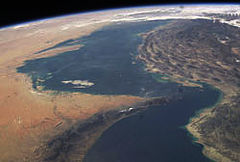Remarks by Commanders are to Keep the Military Prepared
» Firuzabadi Retracts Threats on Blocking the Straits of Hormuz
Eight days have now passed since the EU oil embargo against Iran went into effect. Ayatollah Khamenei has remained silent on the issue while his representatives in the armed forces have retreated from their threatening positions on blocking the Straits of Hormuz if the oil embargo went into force. The highest military official in the Islamic republic, the chairman of the joint chiefs of staff major general Hassan Firuzabadi this week announced, “While we do have plans to block The straits, we will not do this.”
Speaking at a seminar titled, the Mahdaviat Doctrine (Mahdaviat means the belief in the return of the prophet of Islam), Firuzabadi commented on the plan prepared by the representatives of the Majlis regarding the blocking of the Straits of Hormuz by saying, “Honorable Majlis deputies are representatives of people and whatever they say or write or vote on is indicative of the message and vote of the Iranian nation.”
Indirectly pointing to the extensive planned propaganda in the last few months on threatening to block the Straits of Hormuz, the general said the threats made by the commanders were the normal duties of the armed forces which must have plans for all contingencies and added, “We shall not do this unless our interests are engendered. The Shiite nation acts rationally and would not be happy if the waterway that transports 40 percent of the world’s oil was disrupted, unless our interests faced serious problems.”
Speaking to Khorasan newspaper, general Firuzabadi pointed to the plan prepared by some Majlis representatives on blocking the Straits of Hormuz and said, “The orders for an operation will be implemented through a higher chain of command and after a decision by the supreme national security council and the approval of the supreme leader, and on orders of the commander in chief. Neither speeches nor interviews have a decisive influence on the flow of oil through the Straits of Hormuz.”
These remarks are meaningful in the context of what an American commander recently expressly said to the effect that if Iran took the wrong steps in the Persian Gulf, all its boats would end up at the bottom of the Gulf.
Regarding the threatening remarks by Iranian military commanders, Firuzabadi had earlier said, “What my colleagues in the armed forces occasionally say is related to missions they have been given to keep the military in a state of readiness.”
In his remarks Firuzabadi referred to himself as “a senior military commander” while prior to his appointment as the chairman of the joint chiefs of staff and prior to being given the title of a “Basiji General” in 1989 by ayatollah Khamenei, he served in the Red Crescent organization and the Construction Jihad of Khorasan province. His a physician by training who held posts in the military medical and assistance fields and was the chief of bunkers and civil defense affairs.
Denial by the Majlis Leadership
At the same time, Majlis Speaker Ali Larijani also implicitly denied that preparations and a bill had been passed by Majlis representatives to block the Straits of Hormuz. “Representatives have the right to express their views on all domestic and international issues and they may propose bills,” he said, and added that some deputies had drawn up such a plan but it had not been put up for review. He also said that if such a bill was officially prepared, then it would go through the committees in the course of the work of the Majlis, again implying that such a draft had not yet been prepared and officially submitted for review.
These remarks follow what had been published earlier last week by Iranian news agencies that about a hundred Majlis representatives, including Arsalan Fathipour, the head of the economic committee and Ibrahim Agha Mohammadi, a member of the national security committee, had prepared a draft bill on blocking the Straits of Hormuz as a way to confront the oil embargo against Iran by the US and the European Union and had put it on the agenda of the legislature.
But even prior to Firuzabadi and Larijani’s softer remarks on the issue of blocking the Straits of Hormuz, Javad Jahangirzadeh, a members of the presiding board of the Majlis had said that the Majlis had not received a draft bill on shutting the Straits of Hormuz, adding, “No final decision on this had yet been taken.”
It should be noted that prior to the implementation of EU’s embargo on Iranian oil, ayatollah Khamenei and his appointee’s in the armed forces all repeatedly had said that their policy was to confront threats with threats (as part of their new defense strategy and include the dictum “respond to threats with threat” and threatened that they would block the Straits if an oil embargo was imposed on Iranian oil. The embargo came into effect on the first day of July, and Iranian leaders backed down from their threats, something that has happened repeatedly on other issues as well, such as the threat to prevent a US aircraft carrier from returning to the Persian Gulf.
Because of the threats by Iranian commanders, some Arab Persian Gulf oil exporting states across the waterway from Iran have implemented projects to reduce their dependence on the waterway should it be threatened.


